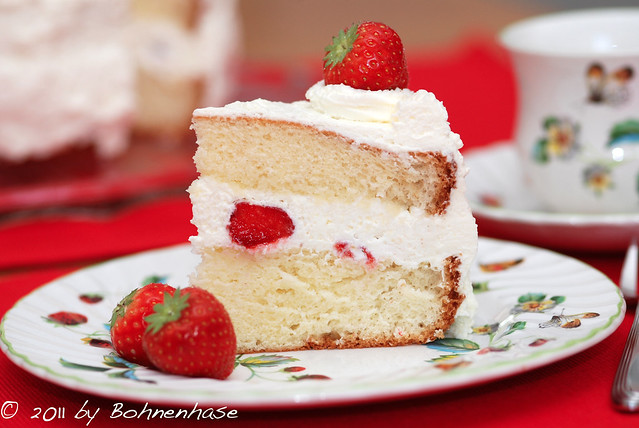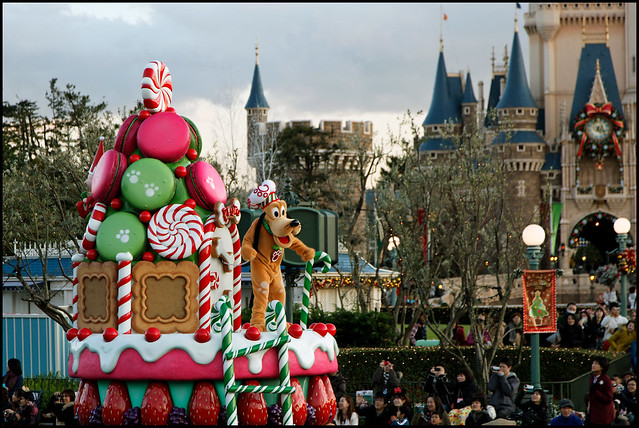Christmas in Japan

Christmas has only been widely celebrated in Japan for the last few decades. It's still not seen as a religious holiday or celebration as there aren't many Christians in Japan. Now several customs that came to Japan from the USA such as sending and receiving Christmas Cards and Presents are popular.
In Japan, Christmas in known as more of a time to spread happiness rather than a religious celebration. Christmas Eve is often celebrated more than Christmas Day. Christmas Eve is thought of as a romantic day, in which couples spend together and exchange presents. In many ways it resembles Valentine's Day celebrations in the UK and the USA. Young couples like to go for walks to look at the Christmas lights and have a romantic meal in a restaurant - booking a table on Christmas Eve can be very difficult as it's so popular!
Fried chicken is often eaten on Christmas Eve/Christmas Day. It is the busiest time of year for restaurants such as KFC and people can place orders at their local fast food restaurant in advance! There was an advertising campaign by KFC in the 1974 called 'Kentucky for Christmas!' (Kurisumasu ni wa kentakkii!) which was very successful and made KFC popular for Christmas!
The traditional Japanese Christmas food is Christmas cake, but it's not a rich fruit cake, but is usually a sponge cake decorated with strawberries and whipped cream. The 'shortcake' emoji [🍰] is Japanese Christmas cake!
Christmas is not a national holiday in Japan. However, often schools are closed on Christmas Day because it's near the start of the New Year school break. But most businesses will treat the 25th as a 'normal' working day.
One piece of music is especially famous around Christmas and the end of the year in Japan - Beethoven's Ninth Symphony and its final act the "Ode to Joy". The music is so famous it's simply known as 'daiku' (which means 'number nine'). Choirs all over the country sing it in German. One choir in Osaka, has 10,000 people in it and is known as the 'Number Nine Chorus'! It's thought it was first sung in Japan at Christmas by German prisoners of War in World War One and over the years it became more and more popular.
Another popular activity at Christmas in Japan, especially in Tokyo, is visiting Tokyo Disneyland (which opened in 1983) and seeing all the decorations and the parades. The Christmas 'season' at Tokyo Disneyland is from the 2nd week in November until Christmas Day. On December 26th, all the Christmas decorations are gone, ready for the New Year celebrations to start! New Year is a very big celebration in Japan. A 'Disney' style Christmas might have also influenced how Japanese culture celebrates Christmas as a fun and romantic time, rather than a religious one. You can find out more about Christmas 2018 at Tokyo Disneyland on the Disney Tourist Blog (goes to a different site).
In Japanese Happy/Merry Christmas is 'Meri Kurisumasu'. And it's written in the two Japanese scripts like this; Hiragana: めりーくりすます; Katakana: メリークリスマス. Happy/Merry Christmas in lots more languages.
Parties are often held for children, with games and dancing. Japanese Christmas Cake is a sponge cake decorated with trees, flowers and a figure of Santa Claus.
In Japan Santa is known as サンタさん 'Santa-san (Mr Santa)' or サンタクロース 'Santa-Kurosu (Santa Claus)'.
(Another Japanese gift bringer is Hoteiosho, a Japanese god of good fortune from Buddhism. But he is NOT related to Christmas.)
If people have Christmas decorations, they are taken down on December 25th and then different decorations are put up for the New Year holidays.
The Japanese New Year (called 'o shogatsu') is more like a traditional Western Christmas. New year is the period where families get together, have a special meal, pray and send greetings cards. New year is celebrated over five days from December 31st to January 4th and is a very busy time.
Japanese children usually get only one gift at Christmas (which young children believe is from Santa). During the New Year holiday, children receive gifts of money, in special envelopes, from their parents, grandparents and other relatives. Japanese children very seldom give Christmas gifts to their parents, siblings or relatives. Only some special friends exchange Christmas gifts.
Last Updated: | Sources Information | Written by: James Cooper


